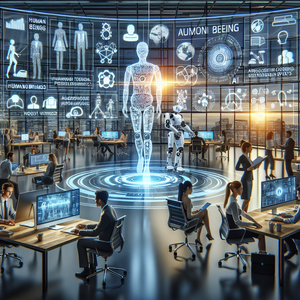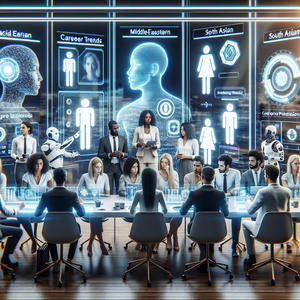
AI and the Evolving Workforce: Navigating Job Risks, Emerging Careers, and Strategies for Success
Artificial intelligence (AI) is reshaping the global job market, bringing both disruption and opportunity. On one hand, roles defined by routine, repetitive tasks—such as bank tellers, data entry clerks, and cashiers—are increasingly vulnerable to automation. Industries like retail, banking, and administrative services are adopting AI-powered tools at an unprecedented pace, streamlining processes once handled by human workers. On the other hand, this transformation is unlocking new opportunities in fields like machine learning, ethical AI oversight, and sustainable technology, where human creativity, judgment, and empathy remain irreplaceable.
Job Summaries:
Bank Teller:
- Bank tellers are steadily being replaced by ATMs, mobile banking apps, and online financial services.
- Simple transactions, like deposits and withdrawals, are now largely automated, reducing the need for human involvement.
- Employees in this field can pivot toward careers such as financial advising or customer relationship management, where human expertise remains critical.
Data Entry Clerk:
- Data entry jobs are known for their repetitive nature and relatively low educational requirements.
- These jobs are being phased out by AI-powered systems capable of processing and organizing data with greater speed and accuracy.
- Workers in this field can future-proof their careers by reskilling in data analytics, programming, or database management.
- Reskilling in these areas allows workers to capitalize on the data revolution rather than being displaced by it.
Administrative Assistant:
- Administrative roles, traditionally focused on tasks like scheduling, correspondence, and document management, are increasingly automated by software tools like scheduling apps and email management systems.
- Transitioning to roles like project coordination or operations management can provide more stability and growth potential.
Customer Service Representative (CSR):
- AI chatbots and virtual assistants are revolutionizing customer service by handling basic queries and transactions.
- These tools reduce demand for human CSRs.
- The human element remains crucial for resolving complex or sensitive issues.
- By honing skills in customer experience strategy or technical troubleshooting, CSRs can work alongside AI rather than compete with it.
Cashier:
- Self-checkout systems, mobile payment platforms, and automated kiosks are reshaping the retail and food service industries, reducing the need for cashiers.
- Workers can transition to positions in inventory management, retail analytics, or customer engagement, where their experience and interpersonal skills are more valuable.
AI Prompt Engineer:
- Professionals in this role design and refine prompts to optimize the performance of generative AI systems like ChatGPT or DALL-E.
- This position demands expertise in natural language processing, critical thinking, and problem-solving, often supported by a degree in computer science.
Machine Learning Engineer:
- Machine learning engineers develop the algorithms that power AI systems, automating processes across sectors.
- This role requires advanced programming skills, analytical expertise, and a background in computer science.
Data Scientist:
- Data scientists harness AI tools to analyze and interpret large datasets, uncovering actionable insights for decision-making.
- Proficiency in statistics, data modeling, and programming languages like Python is essential.
Ethical AI Officer:
- Ethical AI officers ensure that AI technologies are developed and deployed responsibly, balancing innovation with societal values.
- This role requires expertise in technology, law, and ethics, making it a cornerstone of sustainable AI adoption.
Generative AI Content Specialist:
- This role blends creativity with technical expertise to oversee the generation of AI-driven text, images, and videos.
- Sought after in industries like marketing and media, generative AI specialists use tools like MidJourney or ChatGPT to craft compelling content.
Cybersecurity Analyst:
- Cybersecurity analysts use AI-powered tools to detect threats, prevent breaches, and safeguard sensitive data.
- A degree in cybersecurity or computer science, along with certifications like CISSP, is typically required.
Healthcare Data Analyst:
- Healthcare data analysts leverage AI tools to optimize care delivery and improve outcomes.
- A background in health informatics or data science, paired with analytical expertise, is key to excelling in this role.
AI Policy Advisor:
- AI policy advisors collaborate with governments and organizations to create frameworks that regulate AI technologies responsibly.
- With expertise in law, ethics, and AI, these professionals ensure that AI serves societal and economic goals without compromising public trust.
Green Tech Specialist:
- Green tech specialists combine environmental science with AI expertise to develop eco-friendly solutions to challenges like energy efficiency and waste reduction.
Upskill and Reskill:
- Take advantage of online platforms like Coursera, edX, or Udemy to learn in-demand skills such as machine learning, data analysis, or cybersecurity.
- Certifications in these areas can make a significant difference when transitioning careers.
Enhance Soft Skills:
- While AI excels at automation, human qualities such as creativity, emotional intelligence, and adaptability remain vital.
- Focus on developing these traits to complement AI-driven systems.
Leverage Support Programs:
- Seek out government-sponsored training initiatives or employer-provided upskilling programs.
- Many organizations are investing in workforce development to prepare employees for the AI era.
Stay Informed:
- Follow industry trends and research reports to understand how AI is shaping your profession.
- Staying ahead of technological advancements can help you identify opportunities before they become mainstream.
The rise of AI is neither entirely a threat nor purely an opportunity—it is a transformative force reshaping the world of work. While some professions are at risk of automation, new careers are emerging that leverage human ingenuity and adaptability. By staying informed, embracing lifelong learning, and cultivating transferable skills, individuals can thrive in the AI-driven economy. The future of work belongs to those who can adapt, innovate, and collaborate with technology rather than resist it.
Explore More Jobs

